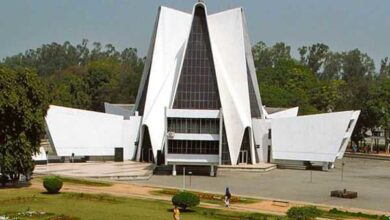Open House: What actions need to be done to prevent water abuse at the height of summer?
There are a number of steps that may be taken to reduce water waste during the hot summer months. To start, encourage public awareness efforts on water conservation and the value of wise and responsible water use. Second, impose stringent rules and fines for water-wasting behaviors including excessive lawn watering, frequent car washing, and leaks left unfixed.

Third, use water-conscious technology that may drastically cut down on water use, such rainwater harvesting systems and low-flow fixtures. Fourth, provide refunds or reductions on water bills to incentivize water-saving behavior. This may help people remember to save water. In order to ensure sustainable water consumption throughout the summer, a mix of technical advances, incentives, and public education may assist handle the increasing demand for water.
Establish policies and raise awareness
The government has a responsibility to ensure that everyone has equitable access to clean, drinkable water, but this obligation ends at access alone when summer arrives and demands for water rise. In order to prevent water usage, a strong structure is required. To do this, the government has to educate the populace, provide standards for the wise use of water, and enforce penalties for breaking the law. It’s also critical that authorities maintain a random watch to look for infractions and punish offenders appropriately. Still, households have a greater responsibility to reduce water waste. Over time, small routine adjustments can yield significant benefits.
For example, instead of using hosepipes to wash cars, porches, and patios, use buckets and cloth for cleaning and mopping; stop flushing out full toilet tanks even for small trash; fix voice indicators and disconnectors on rooftop water tanks to stop wastage by overflow; stop piling up laundry after a small use and only run washing machines on full loads; collect rainwater and discarded RO water for gardening and cleaning purposes; water plants and open garden sprinklers in the morning or evening, but only for a brief period of time; and stop using water faucets when not in use.
In actuality, conserving water and preventing its usage are mutually exclusive. Even if the need for water rises as the temperature rises, we shouldn’t choose to appreciate water just for the present and take it for granted in other situations. Since water is the basis for our sustainability, we should always adopt these modest routines.
Verify overflow and steer clear of abuse
First and foremost, it is important to stop morning vehicle wash overuse of water. The car wash companies waste a lot of water and damage owners’ automobiles by using pipes. They should be told by the owners not to wash their cars with too much water. Second, women in the home need to be made aware of the need to constantly check all of their taps to see whether any water is flowing from them unnecessary.
All faucets that release water more often than necessary or that they are not using should be shut off right away. Finally, and perhaps most importantly, there are several locations across the city where water is regularly leaking out of MC water equipment; these spots need to be checked up right now by authorities. Since water continues to flow from such equipment needlessly and continually, appropriate action should be taken to permanently close it.
Put up smart meters and levy high fees
The most valuable element in nature, water is largely responsible for the genesis and continuation of life. However, water waste diminishes the value of water, however it may be minimized, if not completely eliminated.
The summertime brings with it an increase in demand for water, but a number of reasons keep the supply under strain. It is thus crucial to monitor and manage demand. Currently, the monthly lump sum cost for water supply is given to both residential and business users. Customers are encouraged and permitted to use water carelessly under this method. Digital meters must be installed at each consuming unit in order to manage and regulate the water supply and halt this trend.
Digital meters may be installed at no cost, and water use beyond the initial minimal units may not always be billed. To deter users from wasting water, however, the water used after the cut-off limit must be subject to a monthly billing system with a steep pricing regime. In this manner, individuals will begin using water more wisely in order to avoid paying the bill, which will help save water and generate more cash that will be required to conserve water for future generations.
Promote drip and sprinkler irrigation
The summer season brings with it a significant rise in water use. While there has been a significant increase in the amount of water used for irrigation in an effort to relieve the intense heat wave, drinking water may also be necessary in order to save life. Conversely, as a result of careless destruction of water-recharging reservoirs and the brutal felling of mountains and forests under the guise of infrastructure development, our natural water supplies are running out.
Water shortage is the result of subsequent ecological changes and environmental changes, and this situation is becoming worse every year. Ironically, deep drilling for wells has also caused the groundwater level to drop dangerously, which is having an impact on millions of people and the productivity of our crops. Notably, India has previously received warnings from the UN about the fast depletion of groundwater brought on by deforestation and heavy urbanization.
It seems that strict action against the over exploitation of natural resources will be necessary in order to preserve water for the environment and habitat. Diversification from water-guzzling crops to less absorbing ones is essential as a cognitive activity to lower the demand for agriculture sector. Aside from this, cost-cutting assistance may be required to promote sprinkler and drip irrigation techniques.
It should be mandatory for all business buildings to construct rainwater tanks in order to save water for their own needs and to install filters in order to channel excess water for treatment and agricultural irrigation nearby. Village ponds and other bodies of water cannot have any form of encroachment. This must be prevented immediately. In metropolitan regions, water supply for homeowners may be restricted by municipal authorities to certain hours, and there must be stringent curbs placed on exceptional waste, such as residential vehicle washes.
It is imperative that the Jal Boards/sewage Boards use scientific methods to regulate supply and establish STPs to purify treated sewage water for the purpose of irrigating community parks and gardens. All things considered, as water is a basic household need, the government will need to provide a sufficient supply throughout the next harsh weather. However, residents have an even greater duty to preserve every drop of water for both their own life and the protection of future generations.
Take actionable measures to prevent abuse.
Water is considered to be ‘father’ by the Sikh scripture Gurbani.Because it offers the basic foundation for life on Earth, Pavan Guru Pani Pita. Nonetheless, because of its finite but diminishing supply, conservation is crucial, particularly in the summer when water shortage becomes a prevalent issue.
As a result, managing its usage requires actionable efforts. Fixing leaky faucets and toilets—which may result in a daily loss of eight liters of water—should come first when it comes to waste management. Low-flow shower heads should be utilized in bathrooms and toilets to avoid its overuse. Bathtub filling should be minimized, and showers should be brief. Installing a bucket flush system allows you to collect cold water runoff before it is too hot to shower and utilize it for toilet flushing or watering plants.
Using water-efficient appliances, just filling the dishwasher halfway, and scraping dishes rather than washing them before loading may all help cut down on kitchen water waste. Mulch should be utilized to preserve soil moisture, which will lessen the need for regular watering. Watering the yard should be done in the morning or evening when evaporation is lowest. Choose drought-tolerant plants for your yard and install water-saving fixtures like rainwater collection systems, dual-flush toilets, and low-flow faucets. When washing automobiles or cleaning outside surfaces, water-efficient techniques should be used, such as using a bucket rather than a hose.
Rather of hosing down, driveways and sidewalks should be swept. Additionally, laundry has to be done wisely with water, waiting to run the machine until the load is fully loaded. Machines that load from the front use less water than those that load from the top. Plants may be irrigated with greywater again. In order to overcome water shortages during the summer, such actions may help reduce the usage of the resource.
Try to adhere to the conventions.
As the summer heat builds, water is still essential for a healthy and happy existence. In order to stay hygienic and enjoy yourself throughout the months of May through September, water is essential. Ensuring that every home has a fast, effective, and continuous supply of clean, safe water should now be the administration’s top priority. In light of the present circumstances, every family has to have access to a sustainable and dependable supply of water that can easily satisfy their daily demands.
To make sure that there is never a water shortage, the government must take all necessary steps. We must determine why this issue has to be highlighted in order to guarantee this. In Punjab, just 20% of farming is done using canal water; the majority of agricultural is done with underground water. According to a recent assessment by NITI Aayog (2021), 109 of Punjab’s 133 blocks have become “dark zones.” After then, things have only gotten worse.
The main reason Punjab lacks water is that groundwater, which is the primary supply of drinkable water in the region, is rapidly running out. It’s because the users themselves are the infringers. In order to make sure that everyone has a safe and enjoyable experience, we must accept accountability for our actions and consciously work to abide by the rules. People have been listening to these methods for years, and second-graders are taught about them.
However, the majority of these methods are disregarded, and the current state of affairs is going to spiral out of control. Still, it’s always advisable to err on the side of caution. In order to ensure a brighter future, let’s talk about these approaches once again. There are a number of easy but efficient strategies to cut down on the amount of water used in our regular home tasks. For example, instead of utilizing high-pressure pipes to wash automobiles, we may use buckets and conventional ways, such as using a jug of water for personal hygiene.
One way to reduce the amount of water used on a daily basis is to take a bath in a bucket rather than a shower. In addition, the government need to implement initiatives like the usage of sprinkler and drip irrigation systems to assist farmers in conserving water and irrigating their crops. Moreover, rainwater collection is a useful technique for optimizing the use of natural resources and getting the most out of the least. This is one approach to prevent water overuse during the hottest part of the summer.
Assure locations with supplies depending on need
The recent rainy spell that affected Dubai, Oman, and Islamabad caused floods and raised concerns among environmentalists on climate change. Life has gone out of control in the region where rain was once thought to be a miracle, particularly in the Middle East’s sand dunes.
In a similar vein, Rajasthan, which was previously noted for having relatively little rainfall, has seen a sharp rise in rainy and floody periods in recent years. Since the Meteorological Department has already forecast a hot summer, it is imperative that the drinking water delivery hours be extended from midday to two pm in order to provide relief from the intense heat.
The agency need to permit watering of the parks and plantations on the center verge at night. Similarly, in order to allow travelers to use the facility for clean, drinkable water, the relevant authorities should firmly enforce a 24-hour drinking water supply at bus stops and train stations. To prevent water from overflowing from public taps because of malfunctions, authorities should monitor them.
Provide MSP to crops that use less water.
There is often a rise in demand for water as summer draws near. Clean drinking water is necessary for people to use at bus stops, train stations, public meeting areas, etc. State municipalities will bear the responsibility of preventing water waste and delivering water where it is required when it is needed.
The public has to be made aware of the need of using water wisely. Roadside car washers who use tap water need to be prosecuted. Similar to this, for best results, indoor plants should be watered in the evening. Penalties for water waste should also be applied to those who leave kitchen taps open. Water should be used wisely by farmers as well.
The advice made by agricultural institutions about the conservation of irrigation water must be closely followed in order to prevent water waste. Groundwater depletion is a major concern. It is best to steer clear of water-guzzling crops like paddy and instead prioritize crops like maize. MSP should be provided by the government for crops that use less water. In some Rajasthani desert settlements, residents must trek several kilometers just to get drinking water. Water should be made accessible by the government via mobile vans in all isolated settlements.
To reuse waste water, a sewage treatment plan has to be created. Rainwater should be conserved by implementing a strategy for water gathering. There is a well-known proverb that states that the Third World War will be fought on water. Every nation and state need to implement appropriate policies for conserving water in their homes and on their farms. Ultimately, unless the public bandes together and takes determined action to preserve water, the government will be unable to act alone.
WHAT TO ASK NEXT WEEK
It seems that the city is not prepared for the monsoon season. The MC’s exaggerated statements about being prepared for the monsoon were revealed by the recent rain, as several highways and towns remain submerged. How can the government prevent waterlogging when the monsoon is still a ways off?







